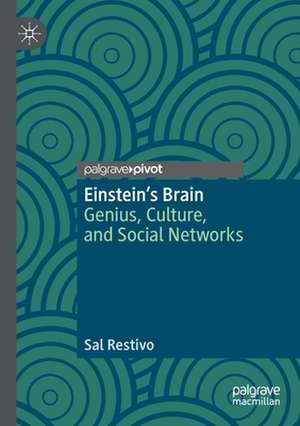Einstein’s Brain: Genius, Culture, and Social Networks
Autor Sal Restivoen Limba Engleză Paperback – 27 noi 2020
This book reviews the research on Einstein’s brain from a sociological perspective and in the context of the social brain paradigm. Instead of “Einstein, the genius of geniuses” standing on the shoulders of giants, Restivo proposes a concept of Einstein the social being standing on the shoulders of social networks. Rather than challenging Einstein’s uniqueness or the uniqueness of his achievements, the book grounds Einstein and his achievements in a social ecology opposed to the myths of the “I,” individualism, and the very idea of “genius.” “Einstein” is defined by the particular configuration of social networks that he engaged as his life unfolded, not by biological inheritances.
| Toate formatele și edițiile | Preț | Express |
|---|---|---|
| Paperback (1) | 413.07 lei 43-57 zile | |
| Springer International Publishing – 27 noi 2020 | 413.07 lei 43-57 zile | |
| Hardback (1) | 419.21 lei 43-57 zile | |
| Springer International Publishing – 27 noi 2019 | 419.21 lei 43-57 zile |
Preț: 413.07 lei
Nou
Puncte Express: 620
Preț estimativ în valută:
79.04€ • 82.73$ • 65.79£
79.04€ • 82.73$ • 65.79£
Carte tipărită la comandă
Livrare economică 31 martie-14 aprilie
Preluare comenzi: 021 569.72.76
Specificații
ISBN-13: 9783030329204
ISBN-10: 3030329208
Pagini: 163
Ilustrații: XV, 163 p. 5 illus.
Dimensiuni: 148 x 210 mm
Greutate: 0.22 kg
Ediția:1st ed. 2020
Editura: Springer International Publishing
Colecția Palgrave Pivot
Locul publicării:Cham, Switzerland
ISBN-10: 3030329208
Pagini: 163
Ilustrații: XV, 163 p. 5 illus.
Dimensiuni: 148 x 210 mm
Greutate: 0.22 kg
Ediția:1st ed. 2020
Editura: Springer International Publishing
Colecția Palgrave Pivot
Locul publicării:Cham, Switzerland
Cuprins
1.
“Einstein” as a Grammatical Illusion.- 2. The Social Self: Beyond the Myth of Individualism.- 3. Einstein’s Brain: A Conspiracy of Mythologies.- 4. Genius: Standing on the Shoulders of Social Networks.- 5. The Social Brain Paradigm.- 6. The Social Brain: Implications For Therapeutic And Preventive Protocols In Psychiatry.
Notă biografică
Sal Restivo is a sociologist/anthropologist who has held professorships and endowed chairs at universities in the U.S., Europe, and China. He is a former president of the Society for Social Studies of Science and author most recently of Sociology, Science, and the End of Philosophy: How Society Shapes Brains, Gods, Maths, and Logics (Palgrave, 2017).
With Mario Incayawar and Jenelle Clarke.
With Mario Incayawar and Jenelle Clarke.
Textul de pe ultima copertă
“What an intriguing achievement! In a provocative and at times chucklesome discussion across six chapters, Restivo encourages us to rethink the individualized sources and attributed value of being an intellectual pioneer. An altogether imaginative argument and enjoyable read.”
—Jaber. F. Gubrium, Professor of Public Health, College of Nursing, University of Massachusetts and Professor Emeritus, University of Missouri, USA
“From a decidedly sociological perspective, Restivo argues that the self is dependent on a person’s social contexts, so much so that the very existence of an individual self is in question. His newest work is a bold re-imagining of the nature of the self, an important antidote to the long-lived but incomplete conception of genius as localized within a gifted individual’s brain.”
—David. S. Moore, Professor of Psychology, Pitzer College and Claremont Graduate University, USA, and author of The Dependent Gene: The Fallacy of “Nature vs. Nurture” (2002); and The Developing Genome: An Introduction to Behavioral Epigenetics (2015).
This book reviews the research on Einstein’s brain from a sociological perspective and in the context of the social brain paradigm. Instead of “Einstein, the genius of geniuses” standing on the shoulders of giants, Restivo proposes a concept of Einstein the social being standing on the shoulders of social networks. Rather than challenging Einstein’s uniqueness or the uniqueness of his achievements, the book grounds Einstein and his achievements in a social ecology opposed to the myths of the “I,” individualism, and the very idea of “genius.” “Einstein” is defined by the particular configuration of social networks that he engaged as his life unfolded, not by biological inheritances.
“From a decidedly sociological perspective, Restivo argues that the self is dependent on a person’s social contexts, so much so that the very existence of an individual self is in question. His newest work is a bold re-imagining of the nature of the self, an important antidote to the long-lived but incomplete conception of genius as localized within a gifted individual’s brain.”
—David. S. Moore, Professor of Psychology, Pitzer College and Claremont Graduate University, USA, and author of The Dependent Gene: The Fallacy of “Nature vs. Nurture” (2002); and The Developing Genome: An Introduction to Behavioral Epigenetics (2015).
This book reviews the research on Einstein’s brain from a sociological perspective and in the context of the social brain paradigm. Instead of “Einstein, the genius of geniuses” standing on the shoulders of giants, Restivo proposes a concept of Einstein the social being standing on the shoulders of social networks. Rather than challenging Einstein’s uniqueness or the uniqueness of his achievements, the book grounds Einstein and his achievements in a social ecology opposed to the myths of the “I,” individualism, and the very idea of “genius.” “Einstein” is defined by the particular configuration of social networks that he engaged as his life unfolded, not by biological inheritances.
